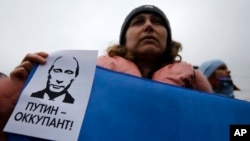Each day, VOA will curate a selection of these editorial opinions, highlight selections, and offer them for our readers’ consideration.
The opinions expressed below are, of course, those of the authors, not the Voice of America.
"Kissinger's Flawed and Offensive Analysis" Editorial response to commentary by Henry Kissinger, by Ben Carnes, communications director for Rep. Trent Frank and President, Congressional Ukrainian Association, published in the Washington Times.
"Due, perhaps, to his extensive dealings with the Soviet Union during his career, Mr. Kissinger makes an unforgivable mistake in his analysis, he states. “The West must understand that, to Russia, Ukraine can never be just a foreign country. Russian history began in what was called Kievan-Rus. The Russian religion spread from there. Ukraine has been part of Russia for centuries …
Hundreds of years of Ukrainian history - including many brutal years under the Soviet system that specifically targeted and killed literally millions of Ukrainians — have been marked by Russian attempts to not only subjugate Ukrainians, but to rob them of their history entirely by claiming there is no separate Ukrainian history.
There may be a variety of views regarding the best resolution to the crisis in Ukraine. However, joining the very chorus of forces that have held down Ukrainians for hundreds of years and from whose shackles Ukrainians overwhelmingly freed themselves in 1991 and 1917 is neither “balanced,” as Mr. Kissinger suggests, nor is it helpful in advancing solutions to the crisis in Ukraine."
"Ukraine Choas is the Fruit of Western Expansion" Commentary by Seumas Milne, British political columnist, published in South Africa's Mail & Guardian.
But Russia's role as a limited counterweight to unilateral western power certainly does. And in a world where the US, Britain, France and their allies have turned international lawlessness with a moral veneer into a permanent routine, others are bound to try the same game.
"The Ukraine Balancing Act" Editorial published in the Japan Times.
The developments in Ukraine pose dilemmas for Japan’s leadership. While some suggest that the prospect of Moscow’s isolation might increase its willingness to make a deal with Japan, the move in the Crimea should strip away all illusions about Putin’s readiness to hand over any of the disputed islands that comprise the Northern Territories.
And while Japan is increasingly engaging with Russia to secure much needed energy supplies, Tokyo must not be seen as unconcerned about solidarity with the West. There is a fine diplomatic line to be walked that acknowledges Russian interests in Ukraine without conceding the dismembering of a sovereign state. That balancing act is just beginning."
"In Ukraine, We've Agreed to Have Our Differences - Until Now" Commentary by Ukrainian novelst Andrey Kurkov, published in the Washington Post.
"In the past I’ve thought of Ukraine’s revolutions as seasonal phenomena, tending to start after the harvest in the fall and end before potato planting in the spring. And in some ways it did feel as if spring arrived Tuesday morning. Russia had given Ukrainian troops in Crimea an ultimatum: Surrender by 5 a.m., or the Russian army will initiate an armed assault. I stayed awake all night, checking the news online every two hours. And when the Ukrainian military did not surrender and Russia did not attack, I felt a sense of relief that war had been averted.
Yet this spring may be very different from previous ones. Even if tensions subside in Crimea, Ukraine will be left with its newly deepened divisions. My fear is that Putin, looking in the mirror, sees Stalin on May 9, 1945, preparing to greet the victory parade in Moscow’s Red Square."







